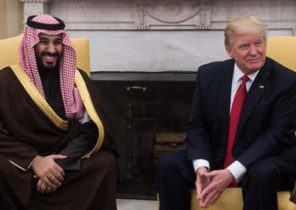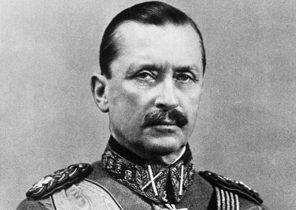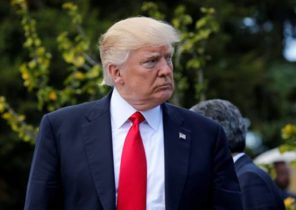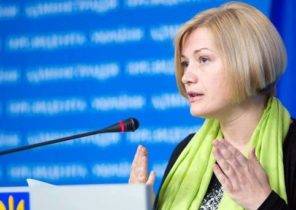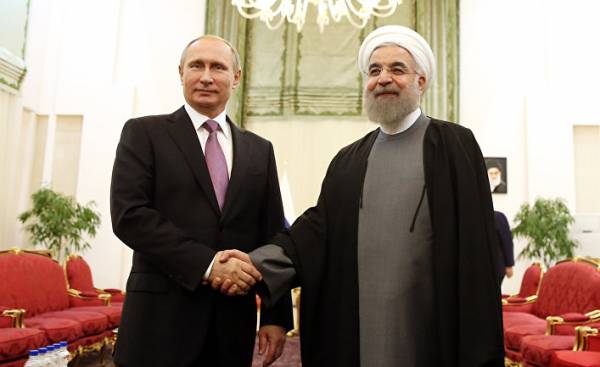
The events unfolding in the middle East, mainly in Syria, has led to a deepening of divisions between allies Iran and Russia. The level of understanding between partners who support the Syrian regime, is constantly decreasing as the diverging interests of the parties in Syria and the region as a whole. The dissatisfaction of the Russian leadership is growing due to the fact that the Iranians prefer European investments and military cooperation with China to the detriment of the Russian-Iranian partnership.
Russia and Iran have taken a unified position in relation to the results of the vote of the house of representatives of the United States Congress on July 25, during which almost unanimously adopted the law on the introduction of new sanctions against the two countries (along with North Korea), and confirmed that they will retaliate. However, this is not likely to have any positive impact on the level of mutual understanding between the two countries on international and regional issues of their common interest.
The fact that countries alike have responded to the new sanctions can be regarded as a necessity, since the parties need each other, but not as evidence of the desire to enhance bilateral arrangements to respond to pressure from the United States.
There are factors that hinder the establishment of trust between the two countries. These constraints are related to the difference in the positions which gradually began to appear on various issues of the international agenda. In addition, in Iran continue to be calls to stop completely rely on Russia — a player who supports Tehran only because of being under pressure from the United States and other powers.
This position is in some way linked to Iran’s historical sensitivity toward Russia. Because Moscow until the nineteenth century remained one of the main sources of threats to security and stability of Iran. Moscow began to see in Tehran is a difficult partner with whom it is more difficult to negotiate, both at the regional and international level — especially against the background of numerous conflicts and accusations against Iran of supporting terrorism and destabilization of the situation in the middle East.
Complex nuclear option
Nuclear agreement between Iran and other powers in the format “5+1” July 14, 2015, is one of the issues which can cause numerous conflicts between Moscow and Tehran in the future. Despite the fact that Moscow continues to support the agreement participated in the negotiation process and contributed to the reduction of tensions around the Iranian nuclear program, it is not clear what position she will occupy in relation to the consequences that will entail the cessation of Iran’s compliance with nuclear agreements. This possibility becomes all the more real against the background of tightening of the administration of U.S. President Donald trump.
Tehran has already begun to explore the possibility of withdrawal from the Treaty. About it on July 17 in an interview with The National Interest, said the Minister of foreign Affairs of Iran Mohammad Javad Zarif, noting that the option of withdrawal from the agreement is considered, however, the price of such a step for Tehran will be high.
The withdrawal from the agreement will mean that Iran will resume development of its nuclear program, including that in the question of capacity and level of uranium enrichment to 20% and to run the most modern centrifuges. As a result, the country will stop cooperation with the International atomic energy Agency and other organizations.
Tehran cannot be sure that Russia, using the veto, prevents the transfer of the nuclear dossier to the Security Council as a first step towards the introduction of a new series of UN sanctions against Iran. Russia is currently undergoing a large-scale criticism from many leading countries, including regional powers, due to the frequent use of the veto to block the adoption of Security Council resolutions against the Syrian regime. This has negative consequences for the Russian image of a large power and a permanent member of the UN security Council.
Even more important is the fact that Russia will not silently observe the resumption of the Iranian nuclear program — because it will increase the probability of activation of Tehran’s efforts to build an atomic bomb. The latter is a “red line”, go through which Moscow will not allow, because it will upset the balance of forces in the region close to the Russian borders — in particular, in the area of the Caspian sea and the middle East. In addition, it could put the region under the threat of unleashing a new war, which is contrary to the interests of Moscow.
The fight for Washington
In addition, Moscow has sought to support Tehran in the negotiations format “5+1” in order to obtain greater economic benefits once agreement is reached by raising the level of economic cooperation with Iran. However, the policy pursued by Iranian President Hassan Rouhani declined to call Russia an obvious dissatisfaction.
The Iranian government against the wishes of Russia to attract foreign investment from other countries and has already signed a number of agreements with some major companies in these countries, such as Airbus, Boeing, Total and Peugeot.
Also did not develop defence cooperation between the two countries, which so waited in Moscow. This was influenced by Tehran’s decision to expand its list of potential partners — he is 14 November 2016 signed an agreement with China in the field of defense and military cooperation. The agreement involves joint military exercises and training to combat terrorism. In addition, the Iranian side expressed the desire to purchase Chinese military equipment like fighter Chengdu J-10.
A direct relation for that crisis of confidence, which contributed to the exacerbation of divisions between Iran and Russia about a deal with air defense systems s-300. The parties failed to resolve the conflict in the second half of 2016, when the Iranian government received the requested military equipment, but it had negative consequences, as has pushed Tehran to strengthen its military ties with other international players.
In addition, the government Rouhani used nuclear agreement as a way in which he managed to establish communication channels with the administration of former U.S. President Barack Obama and to the possibility of future talks on regional issues unrelated to Iran’s nuclear program. Among these problems are the Syrian conflict and the fight against terrorism. It should be noted that all of these steps have not been approved by Moscow.
Growing concerns
Russia believed that the Iranian-American rapprochement could disrupt Russian plans in the region — especially against the background of increasing political and military intervention by Moscow in the Syrian conflict, which began in September of 2015, just two months after the conclusion of the agreement on the Iranian nuclear program.
It is interesting that Iran, despite the support of the military intervention of Moscow in the conflict in Syria to protect the regime of Bashar al-Assad, did not hide their concern about the fact that Russia became the main player in the Syrian arena, able to shape the development of conflict and challenge Iranian influence.
This anxiety only increased when Russia began to attempt to raise the level of mutual understanding with other international and regional powers like Turkey and the United States after coming to power of President Donald trump 20 Jan 2017.
Evidence of this was the agreement on ceasefire in the South-Western part of Syria, concluded under the aegis of Russia and the USA agreed in the meeting of the two presidents on the sidelines of the summit in Hamburg on 7 July this year. For its part Iran has not only expressed dissatisfaction with the fact that he was not given the opportunity to take part in the discussion of this initiative, but immediately said that it is not interested.
Most of all Tehran is concerned that the conclusion of agreements between Moscow by Washington could hinder the efforts of Iran to strengthen its influence in the Syrian territory. The administration of the tramp made no secret of his desire to exacerbate the contradictions between Tehran and Moscow. Think this is one of those goals that trump pursues, increasing the level of coordination with Russia in Syria.
Also note that Moscow did not Express any objections to the issue of military strikes Washington convoys Pro-Iranian militias in Syria, pointing out that she is not satisfied with Iran’s advancement and its allies on Syrian territory.
The paradox lies in the fact that in different periods both Russia and Iran tried to cooperate with the United States, but did not find the Foundation on which this cooperation could be based. This is clearly demonstrated by the recent sanctions by America, which put Moscow and Tehran in the same team.
We can conclude that the forced solidarity between Iran and Russia has its limits. It is becoming more apparent as differences arise between the parties about how to resolve certain issues of interest to both parties.



